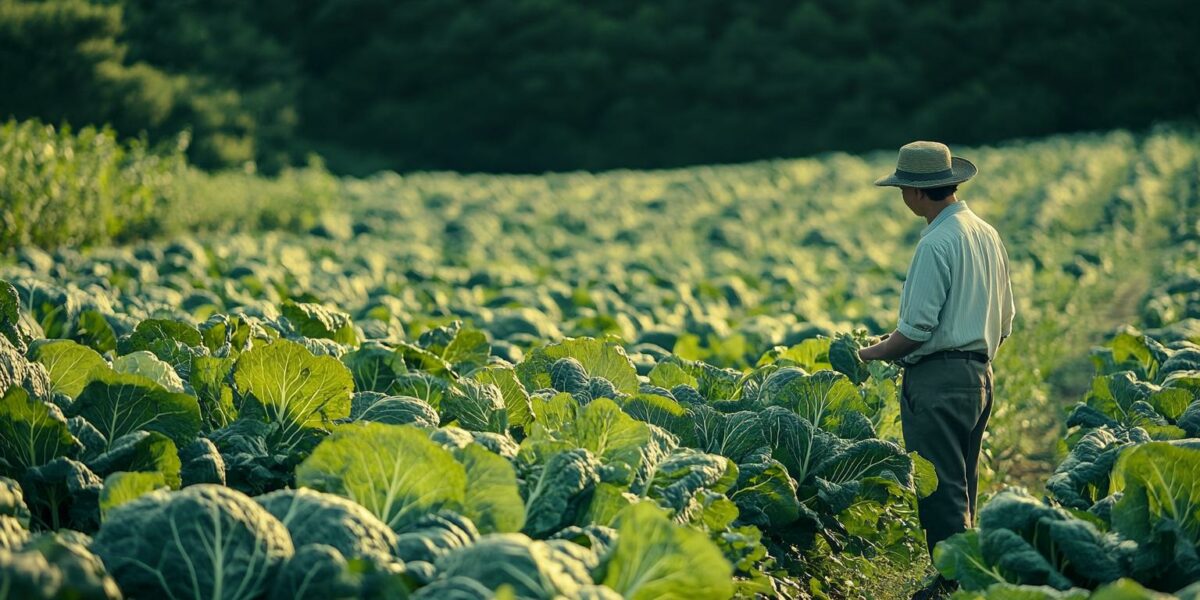Climate Change Threatens Kimchi Cabbage Production
South Korea’s beloved kimchi, a cornerstone of its culinary heritage, faces an unprecedented challenge. Climate change is altering the agricultural landscape, making it harder to grow the essential cabbage. As temperatures rise, the traditional farming regions are becoming less viable, posing a significant threat to this national staple.
The Rural Development Administration, a state farming think tank, has raised alarms. Their climate change scenarios predict that the kimchi cabbage farming area will dramatically shrink. From the current widespread cultivation, only 44 hectares may remain in the next 25 years, with highland growing areas disappearing entirely by 2090.
This shift not only endangers kimchi production but also impacts the agricultural economy and food security of South Korea. Farmers dependent on cabbage crops are facing uncertain futures, and the market may see a significant rise in kimchi prices as supply dwindles.
Efforts to adapt to these changes are underway, but the speed and scale of climate change pose formidable challenges. Agricultural scientists and policymakers are in a race against time to find solutions that can sustain kimchi cabbage production under new climatic conditions.
Adapting to New Climate Realities
In response to these threats, South Korea is exploring various adaptation strategies. These include developing more climate-resilient cabbage varieties and altering farming practices. However, these solutions are still in the experimental stages and may take years to implement effectively.
One approach being considered is shifting the cultivation to regions with cooler climates. This could involve significant changes in land use and farming infrastructure. The government is also looking into advanced agricultural technologies like hydroponics and controlled-environment agriculture.
Additional measures include:
- Research and development of heat-tolerant cabbage strains.
- Investment in modern irrigation systems to combat water scarcity.
- Implementing sustainable farming practices to enhance soil health.
While these steps are promising, they require substantial investment and coordination among stakeholders. The urgency of the situation demands swift action to secure the future of kimchi cabbage farming.
Economic and Cultural Impact
The potential decline in kimchi cabbage production has far-reaching implications beyond agriculture. Kimchi is not just food; it is a cultural symbol deeply embedded in South Korean identity. A shortage could affect national pride and the daily lives of millions who consume kimchi regularly.
Moreover, the economic repercussions are significant. Reduced cabbage yields could lead to higher prices, affecting both domestic consumption and international exports. South Korea, known for its kimchi exports, may face global market challenges if the supply diminishes.
Local farmers, who form the backbone of the kimchi industry, are at the forefront of this crisis. The potential loss of livelihood due to climate change-induced agricultural shifts is a stark reality they must confront. Government support and innovative solutions are crucial to help them adapt and thrive.
The intertwined nature of climate change, agriculture, and cultural heritage underscores the importance of addressing these issues holistically. By doing so, South Korea can safeguard not only its food security but also its cultural legacy.
Global Lessons and Future Prospects
The challenges faced by South Korea’s kimchi cabbage farmers offer valuable lessons for the global community. As climate change continues to affect agriculture worldwide, countries must learn from each other’s experiences and develop collaborative strategies to mitigate impacts.
International cooperation in agricultural research can accelerate the development of climate-resilient crops. Sharing knowledge and technology can help nations better prepare for the future, ensuring food security in the face of climate uncertainties.
Furthermore, this situation highlights the need for comprehensive climate action. Reducing greenhouse gas emissions and investing in sustainable practices are essential to curb the adverse effects of climate change on agriculture and beyond.
Ultimately, the plight of South Korean kimchi cabbage farmers is a microcosm of the broader environmental challenges we face. Addressing these issues with urgency and innovation will be key to building a resilient and sustainable future for all.



Luke
Investing in advanced agricultural technologies sounds promising. Hope it’s effective soon!
jaydenmirage
What are the alternative options if cabbage becomes too scarce?
Valeria
Maybe we should start growing cabbage in our backyards! Just kidding, or am I? 🤔
JackQuester
This is a wakeup call. Climate change is real and it’s affecting our food!
charliecascade
Can the government do more to support the farmers financially?
elijah
Oh no, no more kimchi for my meals? 😱
James
Thank you for bringing this issue to our attention. We need to act now!
Andrew_Galaxy
Is there any chance we can get imported cabbage to alleviate the shortage?
masonillusionist4
Wow, this is really worrying. How can we help support the farmers?